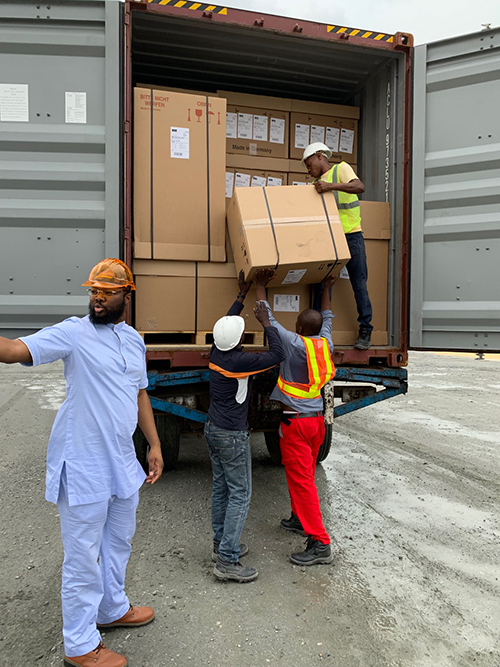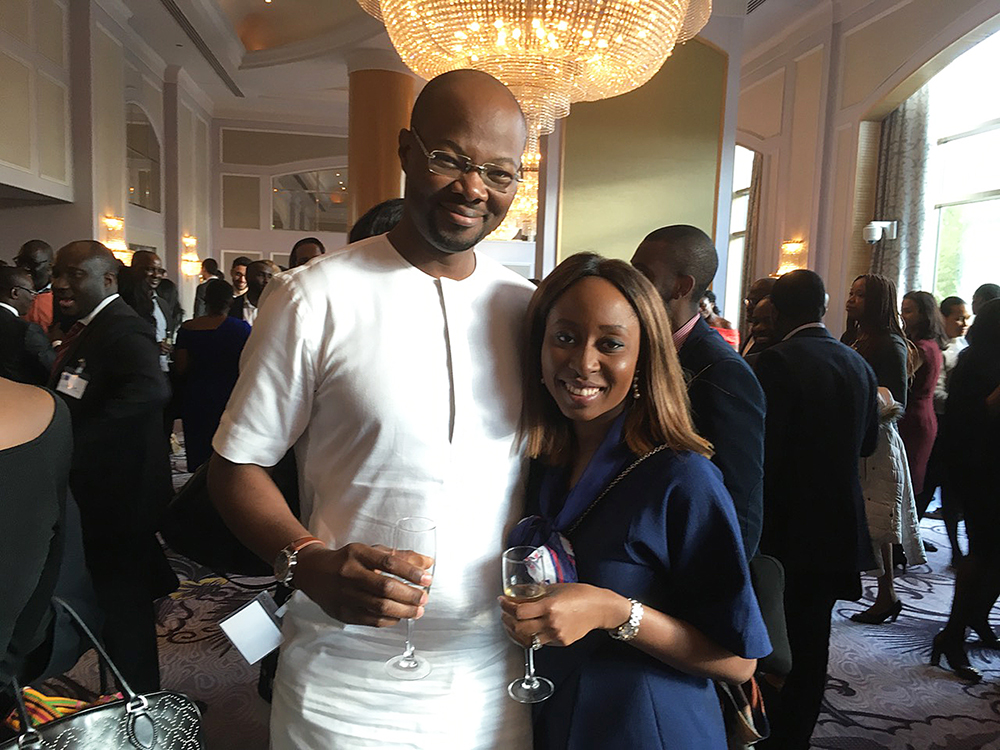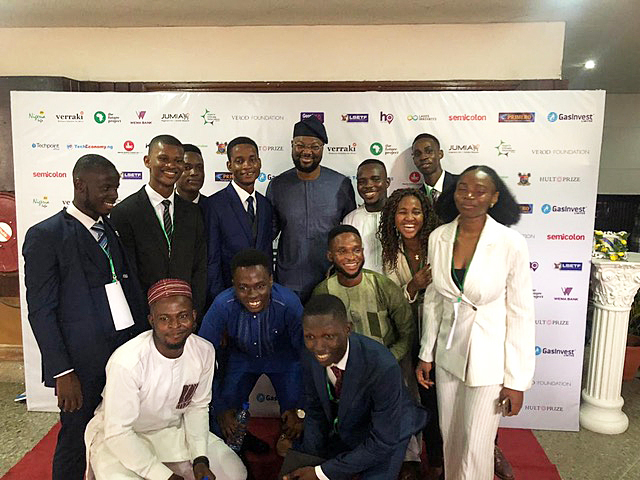Interview by Visual Collaborative
October 2019 11 min read
Akinbo Akin-Olugbade is the co-founder of Kawai Technologies, a multidisciplinary logistics, engineering, and procurement company that works across Nigeria. Accomplished across several sectors his career blossomed following a transition from the United Kingdom. As a special feature in our “Supernova” interview series, we invite you to enjoy Akinbo’s boldness and insightful business perspective of what it takes to make it as an entrepreneur in frontier markets such as his.
(VC) Outside numerous accomplishments and steady rise as a business founder and community influencer, who is Akinbo Akin-Olugbade?
(Akinbo) I’m a bit of a complicated soul, often contradictory, very meticulous, with a mild obsession for precision. Over-analytical people would call me eccentric, but I think it’s just a polite way of saying I am a little strange. I have a very accomplished wife, who accepts my feet of clay, as well as two wonderful children, who as all children do, think their father is the greatest in the world. I read a lot; as I think the more you know, the more you can contribute – and more often than not you’ll find me with my head stuck between the pages of a book. No knowledge is ever wasted; If nothing else, read.
(VC) A perfect world does not exist, but if one did, what core values would Akinbo make a staple in the community?
(Akinbo) We would have to start with the community I most identify with; which currently is where I spend most of my time – Lagos. There is only one core value we need more of – Trust. Trust is the foundation of relationships and more importantly, trust is the value upon which modern society is designed and built. There are so many areas of our lives here that are deficient simply because there is a profound lack of trust between the participants; for example, I do not trust my fellow man to respect the boundaries of my property and so I have walled it in. We do not trust the government to make proper use of our taxes, so we choose not to pay. We do not trust the police, and so we do not call them when there is a problem. Similarly, we do not trust the power company to supply us with electricity, and so we purchase generators. Lastly, trust in our politicians has eroded, and so we do not care about who we ‘elect’ into office. The list is endless and affects interpersonal relationships, employment relationships, and government relationships, the lack of trust is pervasive and has cut through our entire society. This is the one, core value we need to emphasize and work on repeatedly as a society until we get it right.
It should be noted though that African leaders of the day have recognized the need to improve upon regional trade amongst ourselves, as this is the path to long-term sustainability
(VC) Given the rising despondency of the political movement in Africa, as a founder, are you more critical about your own business, or more optimistic given the trajectory of the continent’s leadership on its intra-trade trade?
(Akinbo) I am usually an optimist, given that caveat, there are two sides to this. The optimism here stems from the multitude of opportunities that the systems we currently have afforded the spry investor and agile entrepreneur, so at a certain level of business our current configuration of laws and trade relations favors a certain type of business person. The pessimist in me would say however that for the average small business owner, or the average employee the current conditions do not favor long term growth; the purchasing power of our incomes erodes without commensurate increase in wages; inflation is still mostly in the double digits in Nigeria, and our various agencies are geared strictly for revenue generation without the context of inter-African trade. It should be noted though that African leaders of the day have recognized the need to improve upon regional trade amongst ourselves, as this is the path to long-term sustainability, and furthermore fosters a true sense of shared interests and community between nations.
(VC) As someone with an engineering background, what are your thoughts on widely used foreign products in mass markets? Some economists may criticize this because of the long-term implications of non-indigenous or locally made products by African countries such as yours.
(Akinbo) Build it and they will come; the caveat being, you have got the build the right product, and to the right quality. We import a vast quantity of products and solutions that we can realistically expect Nigerians in Nigeria to provide, and I think our government needs to put more focus on creating an environment that will encourage Nigerians to make these products and provide these solutions. No, that does not mean banning their importation, but yes, it does mean making it such that as a consumer I see no reason to purchase the imported item when the Nigerian product is much the same or possibly better.

Photo courtesy Kawai Technologies
We are seeing a lot of this in the fintech sector, where foreign solutions are just not the right fit for us in Nigeria, and so our enterprising people are developing homegrown solutions and applications tailor-made for our unique circumstances, and there has been some tremendous success in this area. Next, we need to make a concerted effort to widen the scope to other areas, like manufacturing, apparel, the food and beverage industry and so many more. Our government should just help us sort out power, give us a favorable business environment and then get out of our way.
(VC) Your female counterpart leaders in business who advocate for equality, talk of misogyny dominating the space. Does this fact get understated or is it all part of the package of the business environment?
(Akinbo) I think it is very understated, and part of the problem is the narrative – everything references the man. When you read a passage in a book, for instance, most passages referencing a hypothetical say something along the lines of “in such and such a situation a man would so and so” or passive masculine references like “chairman”, or “businessman”, throwaway phrases like “it’s a man’s world”. These references need to change to become more gender-neutral, or preferably for balance, female led – so businesswoman needs to be talked about more, the hypothetical needs to reference “she” more, and so on. Women need to step up and create their own world for all of us to partake in, nobody is going to give way just because the person in their way is a woman. For the system to change, you have to actively get involved, and aim to get to a position with leverage to influence the system; you cannot reasonably expect the incumbents to want to change a system that benefits them. Take my wife, for instance, she is not afraid to speak up for herself when it is in her interest to do so – I would bet on her against any three men combined. More women need to show that level of confidence in themselves, and in what they want from the world. So for now, it’s part of the package as you say, but it is changing as more women contribute to the business landscape.
What we can all do is dedicate ourselves to being the best version of ourselves possible, and trust me if you are the best at whatever it is you can do, you can make a success out of it, both personally and as a business
(VC) What can you candidly tell young aspiring entrepreneurs about success and risk in business working in your country?
(Akinbo) Success is incremental. This is a lesson that should be taught right from primary school. I fear that today’s youth have this erroneous point of view that they deserve success and all the accouterments that come with it. Let me be candid – the world owes you absolutely nothing. Though screaming, you come into it celebrated by just a few, and you will leave it quite as unremarkably as you arrived a few score years later. What we need to focus on is an impact, what can you do while you are here to make a difference? What can you contribute that will allow your memory to linger that much longer? What we can all do is dedicate ourselves to being the best version of ourselves possible, and trust me if you are the best at whatever it is you can do, you can make a success out of it, both personally and as a business. There is a man, John Collins in the United States that makes paper airplanes, he spent decades perfecting the humble paper airplane, and now he writes books and chairs conferences on aerodynamics and flight. Segun Olaleye, better known as Segun Gele, took our Yoruba headdress the gele to a whole new stratosphere, turning his art into a globally demanded service business. The point being, do it well and someone will want it, and more importantly, someone will want to pay for it. For example, lots of companies operate in the same business segments as Kawai, but no others will go into the same level of detail that we do, and our clients are happy to pay for that attention to detail. The flip side of this conversation is a risk, every good businessperson needs to know when to draw the line, and the important thing here is to learn from mistakes – if you haven’t made mistakes, then you are not stretching yourself or your business. The trick is making the right mistakes, the ones you can learn from and go on to build a better business.

Mr and Mrs Akin-Olugbade, courtesy Kawai Technologies
(VC) Some mention different historical times as a period they admire for economic affluence. If you could time-warp to any era, what time would it be and why?
(Akinbo) Ah, this is an interesting question, and it would definitely depend on where. If it was to be Europe, then certainly The Renaissance; what I wouldn’t give to see The Medici’s influence on the architecture and art of Florence, or be a fly on Da Vinci’s wall in one of his workshops while he engineers one of his numerous inventions, or make my fortune running a Guttenberg Printing Press, or see the Rings of Saturn for the first time in human history through Galileo’s Telescope – this was a 300 year period of astonishing scientific advancement, which made incredible fortunes, and was an unprecedented period of economic activity. The other period I would also very much like to see is the oft-talked about the pilgrimage of Mansa Musa during the 14th century. How did this king acquire such fabulous wealth, to the extent that he single-handedly depressed gold prices around the world after his pilgrimage to Mecca? That would be a tale to tell. I still believe Mansa Musa’s trip is what sparked the original interest of the Europeans in Africa; he and thus the Mali empire was (to my sense at least) our equivalent of the Aztec Empire’s draw on Spain to the Americas some 200 years later. The last time period I would like to visit would be the years just following Nigeria’s independence – more for political context on present-day events – you have to understand where you are coming from to fully appreciate where you are I suppose.
(VC) At this stage of your career considering your commitments, If you could partner with a specific enterprise or individual. Who would it be and why?
(Akinbo) Everyone has the level at which they can operate most efficiently and most purposefully, I think the mistake a lot of people make is punching above their weight class, so while I would love to say that I would make a superb business partnership with one of the great captains of industry such as Mike Adenuga or Aliko Dangote, that would be disingenuous, and ultimately would not be beneficial to even myself if given such an opportunity right this minute. I think my business and career would be better served by building a strategic partnership with a CEO like Professor Toyin Ashiru of Tricontinental Group, or a quietly successful export juggernaut like Engineer Olumuyiwa Aiyegbusi of Olu Olu Foods; people such as these are the silent ambassadors pushing forward Nigeria’s frontiers, and I would love to be part of the story of Nigeria’s transformation with them.

Photo courtesy Kawai Technologies
(VC) In addition to your expanding business Kawai Technologies, what can the region expect from Akinbo within the next 36 months?
(Akinbo) I do a lot of CSR related work these days, I’m a firm subscriber to the philosophy of “each one, teach one.” So I will continue to support endeavors like The Bridge Program, preparing graduates for the real world, The University of Lagos Engineering Department through their PAADC annual competition, the Nigerian Society of Engineers Adigun Arewa Mentorship Programme, as well as the continuing advocacy works I do especially through the Lagos Chamber of Commerce and Industry. I will spend the next 36 months building on all these foundations as well as creating new ones, after that, who knows? – “Whatever the mind of man can conceive and believe, it can achieve”, Napoleon Hill.